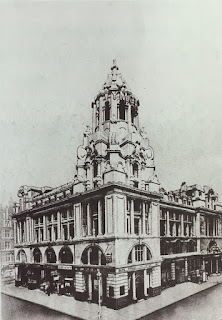YMCA moving in another direction - Anniversary Review Part 9
The scope of the YMCA's work was also moving in another direction - to include women and girls. The Young Women's Christian Association, set up in 1855 was originally an alternative to the YMCA for women and has always been a separate organization. But by the 1960s women and girls were becoming involved with the YMCA - staying in hostels and joining mixed youth clubs. There were even some associations with clubs just for women. In response, in 1964 the national movement allowed women to become full members and encouraged local YMCAs to do the same.
The 1960s and early 1970s were generally a time of re-assessment for the YMCA, centered on a 1970 report, "Changing Needs and New Perspectives".
As a result of the report, it was decided to allow local YMCAs to have a single form of the membership, rather than full and associate membership if they wished. The conditions for this new membership did not stipulate that the member should be a Christian basis of the movement.
A new structure, with an annual National Assembly of representatives from local YMCAs and the national board to decide on policies, was also introduced.
The report said the YMCA should consider how to bring back meaning and vitality and adapt itself to itself to changes in society. It predicted rising living standards, shorter working weeks and more leisure time and holidays would increase demand for high-quality leisure facilities.
 |
| The London Central YMCA Hostel, which opened in 1912 and was demolished to make way for a new building in the early 1970s |
The story of the YMCA in the 1970s and 1980s both follows, yet also contradicts, these predictions.
The YMCA has met the demand for more modern sports and leisure facilities and shifted its work from competitive sports to " health and fitness for all". Today the emphasis is on activities such as circuit - training and aerobics, and on general health education, including drugs and alcohol awareness.
London Central YMCA has become the biggest trainer of aerobics and exercise teachers in the country.
Many local YMCAs have invested in sophisticated health and fitness equipment and run classes for everyone from toddlers to those aged fifty - plus, whilst the YMCA's national centres at Lakeside, Cumbria, Fairthorne Manor, Hampshire and Dunford House, Sussex, offer a range of outdoor activities, management training and other courses and leisure breaks.
But since 1970 the YMCA has also boosted its work with those in serious need. Unlike the rosy society predicted then, the economic recession has meant many young people have found themselves unemployed and homeless.
The YMCA has responded to these and other social problems and today it provides housing for the homeless, training for the unemployed, counseling for the abused or those involved in drug abuse, numerous health, and fitness programmes and wider community support.
It is the largest youth welfare charity in the country, running youth programmes, clubs, and recreational activities, many of these in partnership with local authorities.
Taken from the 150th Anniversary Review
Comments
Post a Comment